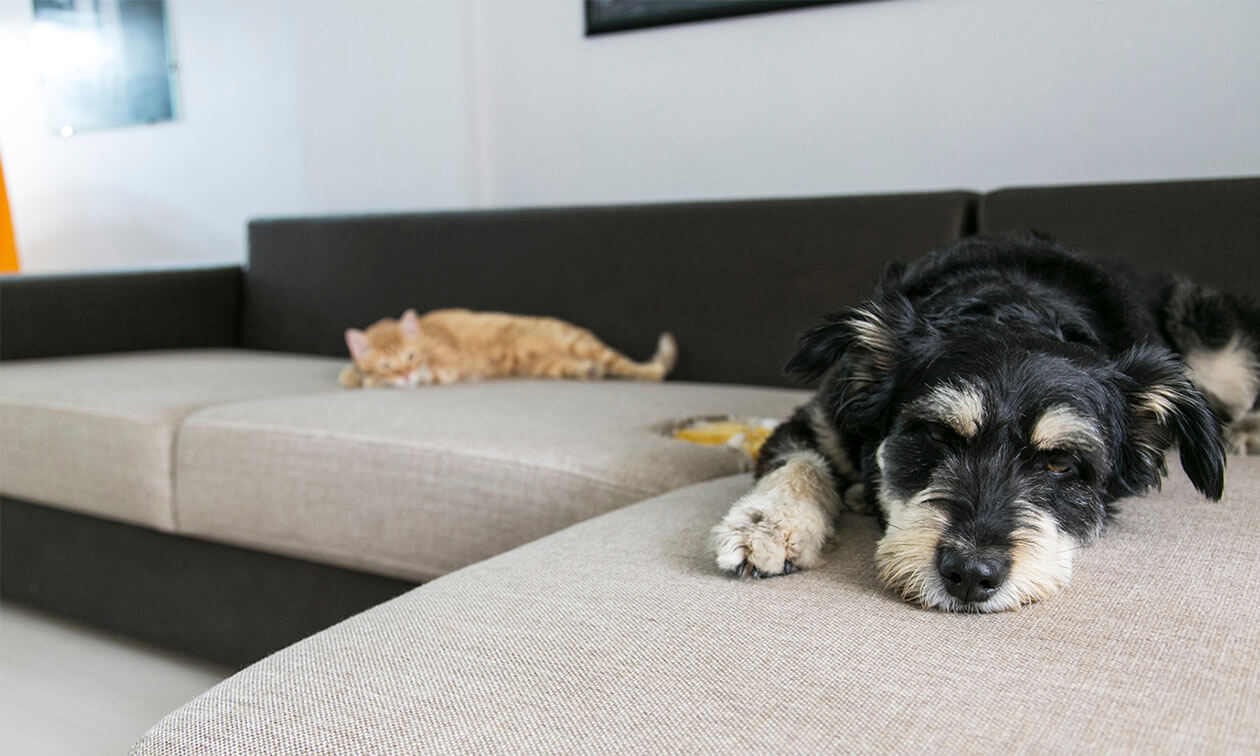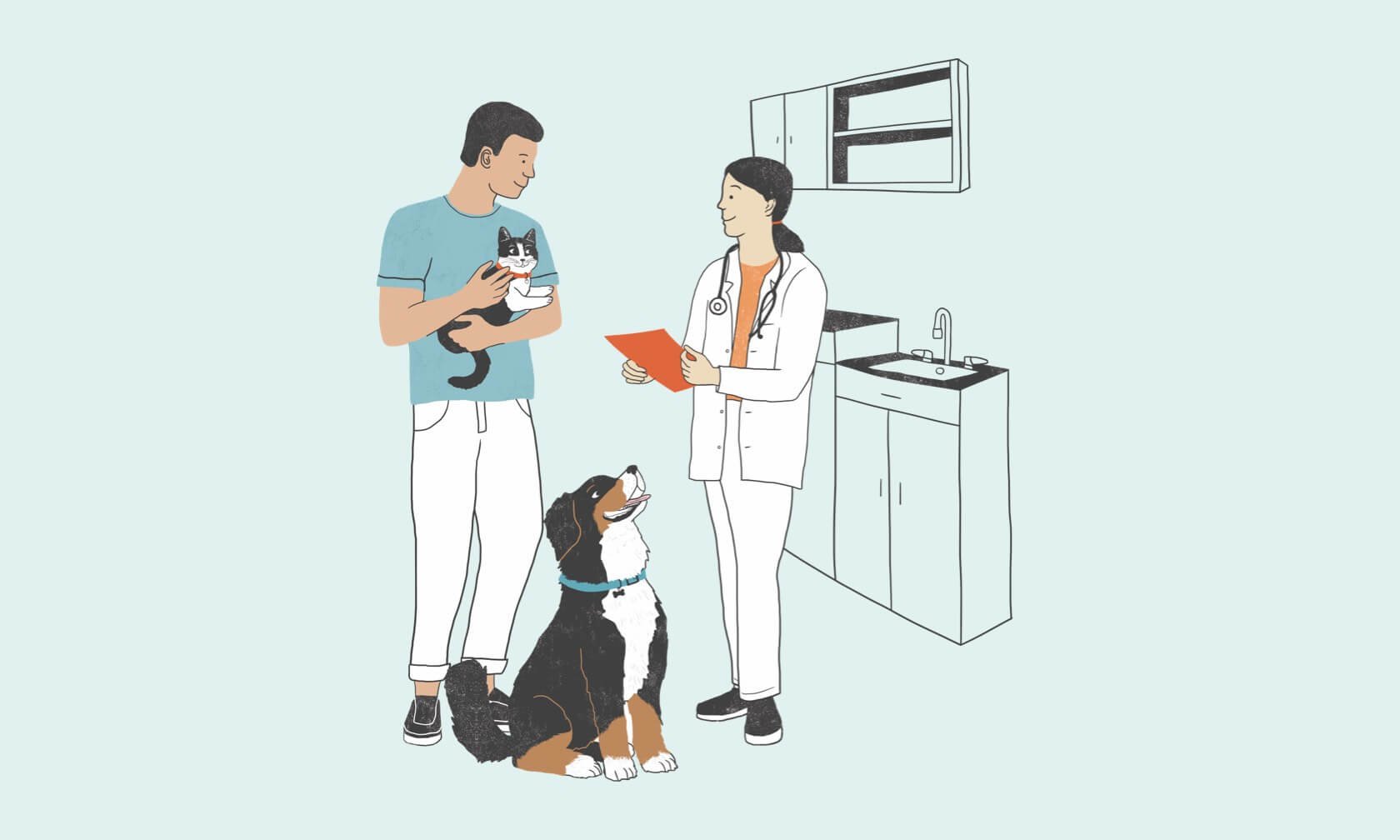The short answer to this question is yes, dogs and cats can get COVID-19, though it’s very uncommon. From 2020 to early 2024, there have been only 235 cases of confirmed COVID-19 in cats and dogs in the United States.1 It’s still helpful to understand the risks to your pet, how you can protect them, and what all of this means for your health.
Can You Get COVID-19 from Your Pets?
In the rare case that your cat or dog comes down with COVID-19, it’s unlikely that you can catch it from them. There is only one verified case of a pet transmitting COVID-19 to a human.2 It’s more likely for a human to transmit COVID-19 to a pet.
Can Your Pets Get COVID-19 from You?
Yes. The common denominator among pets infected between 2020 and early 2024 is that they had prolonged and very close contact with their owners who were ill with COVID-19.3
Signs of COVID-19 in Cats and Dogs
The signs of COVID-19 are similar to other respiratory in pets.
Signs of COVID-19 in dogs mimic canine infectious respiratory disease complex (kennel cough).
Signs of COVID-19 in cats may mimic the more common viral upper respiratory infections, making diagnosis more difficult.
Many cats and dogs with COVID-19 show no signs of illness. Most pets develop mild signs that can be managed at home. Pets rarely develop more serious signs that require veterinary care and hospitalization.3
Here are some of the signs you may notice if your dog or cat has COVID-19:
- Tired, not as playful, or unwilling to exercise
- Coughing
- Sneezing
- Nasal discharge or runny nose
- Eye discharge
- Decreased appetite
- Vomiting
- Diarrhea
- Fever
Your pet should be seen immediately if they have any of these more serious signs:
- Frequent coughing that prevents rest
- Breathing faster than 40 breaths per minute at rest, increased effort when breathing, or noisy breathing
- Blue, purple, or pale gums
If you’re sick with COVID-19 and your pet needs to see a veterinarian, ask a friend or family member to take them for you. Be sure to let the vet healthcare team know prior to your visit that you have COVID-19. If that is not an option, ask your veterinarian to see your pet curbside. You will stay in the car wearing a mask when the veterinary staff members come to the car. They will take your pet inside the clinic for an examination. The veterinarian will contact you by phone or talk to you at the car to discuss the possible diagnosis and treatment options.
Treatment for Pets with COVID-19
There is no specific treatment for cats and dogs with COVID-19. Treatment is designed to relieve clinical signs and may include:
- IV or subcutaneous fluids to bring down fever and alleviate dehydration
- Cough suppressants if the cough is severe
- Appetite stimulant to help increase the appetite
- Oxygen therapy in the hospital to help the pet breathe more easily
How to Prevent COVID-19 in Your Pet
The good news is that illness in pets from COVID-19 is very uncommon. The best way to protect your pet is to distance yourself from them if you have COVID-19. Of course, when you’re sick, nothing is better than cuddling with your beloved dog or cat, but studies have shown that is exactly how the virus is transmitted to them.3 If you’re sick, it’s best to have someone who is not sick care for your pet. If that isn’t possible, wear a mask and wash your hands frequently. Do not kiss, share food, sleep with, or let your pet stay on your lap.
Your pet does not need a mask, sick or not. Masks can be dangerous to dogs and cats, especially brachycephalic pets (flat-faced, short noses) who have smaller airways. Pets can develop intestinal blockages if they eat a mask. Their fur also does not need disinfection with wipes or sprays, as there is no evidence that the virus can spread from the skin or fur of pets.
If you or your pet have COVID-19, your pet may not understand why they aren’t receiving their usual amount of hands-on attention. Keep in mind that it’s ultimately for their benefit. Once the virus passes, you can give them all the love they were missing.
ZPC-04490
- Confirmed Cases of SARS-CoV-2 in Animals in United States. USDA Animal and Plant Health Inspection Service. https://www.aphis.usda.gov/aphis/dashboards/tableau/sars-dashboard. Accessed February 23, 2024.
- Suspected Cat-to-Human Transmission of SARS-CoV2, Thailand, July-September 2021. PubMed. https://pubmed.ncbi.nlm.nih.gov/35666777/. Accessed February 23, 2024.
- SARS-CoV2 Infection in Dogs and Cats is Associated with Contact to COVID-19-positive Household members. National Library of Medicine. https://pubmed.ncbi.nlm.nih.gov/36163676/. Accessed August 21, 2025.



